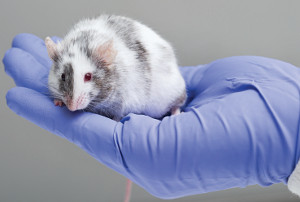Concordat to broaden understanding of animal research

The Wellcome Trust Sanger Institute has signed the Concordat on Openness in Animal Research in the UK, which has been developed by Understanding Animal Research in collaboration with leading research institutes. The agreement, which aims to broaden understanding and acceptance of humane animal use in biomedical research, calls for research institutes to be transparent with the public about all aspects of research conducted using animals.
More than 72 organisations in the UK have signed the Concordat, making four key commitments: to be clear about when, how and why animals are used; to enhance communications with media; to be proactive in providing opportunities for the public to learn about animal research and to report publically on their progress on an annual basis.
“From our foundation in 1993, we have fostered the view that our research is conducted for the benefit of the public and is accessible by the public. This important Concordat places research with animals formally in that same vision.
“Research with animals is essential to developing new treatments for human and animal disease. However, we understand that some people have concerns: openness helps to address some of those concerns. The Concordat is an important part of our dialogues with those for whom we conduct our research.”
Professor Mike Stratton Director of the Wellcome Trust Sanger Institute
Where possible, the Sanger Institute uses cells grown in the laboratory or computer models to conduct its research into the genetics of diseases such as cancer and diabetes. However, sometimes these diseases can be fully understood only by examining the interaction between organs, cells and genes in the context of a living organism; knowledge that is essential in order to discern how disease progresses and how it might be prevented or treated.
The Sanger Institute houses mice, zebrafish and laboratory-bred frogs, all of which share a large proportion of genes with humans and can provide a wealth of information about the genetic basis of disease.
“It is essential that the public is fully informed about the work we do to promote animal welfare, reduce the number of animals we use and minimise suffering. We are committed to informing the public about our research and sharing good practice with the wider research community. As part of this initiative our facility already regularly welcomes individuals such as journalists and scientists from other research institutes.”
Dr James Bussell Head of the Sanger Institute Research Support Facility
More information
Selected websites
Understanding Animal Research
Understanding Animal Research aims to achieve broad understanding of the humane use of animals in medical, veterinary, scientific and environmental research in the UK. It is a not for profit organisation funded by its members.
The Wellcome Trust Sanger Institute
The Wellcome Trust Sanger Institute is one of the world’s leading genome centres. Through its ability to conduct research at scale, it is able to engage in bold and long-term exploratory projects that are designed to influence and empower medical science globally. Institute research findings, generated through its own research programmes and through its leading role in international consortia, are being used to develop new diagnostics and treatments for human disease.
The Wellcome Trust
The Wellcome Trust is a global charitable foundation dedicated to achieving extraordinary improvements in human and animal health. We support the brightest minds in biomedical research and the medical humanities. Our breadth of support includes public engagement, education and the application of research to improve health. We are independent of both political and commercial interests.


